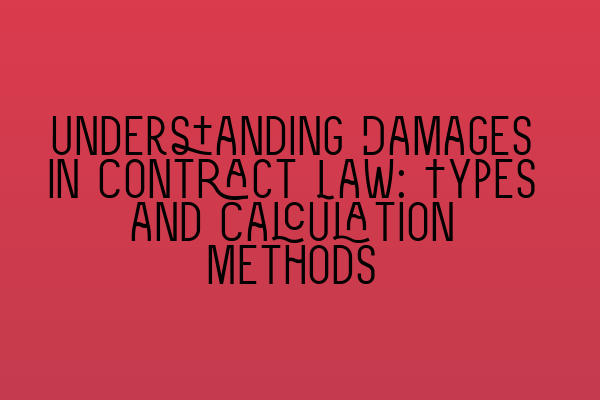Understanding Damages in Contract Law: Types and Calculation Methods
When it comes to contract law, one of the important areas to understand is damages. Damages are a legal remedy that aims to compensate the injured party for the losses suffered due to a breach of contract. In this article, we will explore the types of damages available in contract law and the calculation methods used to determine the amount of damages.
1. Types of Damages:
1.1. Compensatory Damages:
Compensatory damages are the most common type of damages awarded in contract law. As the name suggests, they aim to compensate the injured party for the actual losses suffered as a result of the breach of contract. These damages are designed to put the injured party in the position they would have been in had the contract been performed as agreed.
1.2. Consequential Damages:
Consequential damages, also known as special damages, go beyond the direct losses suffered by the injured party. They are intended to compensate for the indirect or consequential losses that arise as a result of the breach. These may include lost profits, lost business opportunities, or other foreseeable damages that flow from the contract breach.
1.3. Liquidated Damages:
Liquidated damages are pre-determined damages agreed upon by the parties at the time of contract formation. They are usually included in the contract as a way to provide certainty in the event of a breach. The predetermined amount of damages provides a clear measure for calculating the compensation owed. However, it’s important to note that the amount of liquidated damages must be a reasonable estimate of the actual damages likely to be suffered.
1.4. Nominal Damages:
Nominal damages are a small amount of damages awarded when the injured party has suffered a breach of contract but has not suffered any actual losses. This type of damages is often awarded to establish the wrongdoing of the breaching party and to uphold the injured party’s rights under the contract.
1.5. Punitive Damages:
Punitive damages are awarded to punish the breaching party for their misconduct and to deter others from engaging in similar behavior. However, it’s worth noting that punitive damages are rarely awarded in contract law cases and are more commonly associated with tort law.
2. Calculation Methods:
2.1. Expectation Damages:
Expectation damages aim to put the injured party in the position they would have been in had the contract been fully performed. The calculation of expectation damages usually involves determining the difference between the value of the promised performance and the value of the actual performance. In some cases, this may include lost profits or other foreseeable losses.
2.2. Reliance Damages:
Reliance damages are awarded when the injured party seeks compensation for the expenses incurred in reliance on the contract. The calculation of reliance damages involves assessing the costs that the injured party has reasonably incurred in preparation for the contract.
2.3. Restitution Damages:
Restitution damages aim to restore the injured party to the position they were in before the contract was formed. These damages are typically awarded when the contract is found to be void or unenforceable. The calculation of restitution damages involves returning any benefits conferred by the injured party to the breaching party.
3. Conclusion:
Understanding the different types of damages available in contract law and the calculation methods used is essential for both solicitors and clients. By having a clear understanding of damages, solicitors can guide their clients effectively and ensure they receive the appropriate compensation in case of a breach of contract.
If you found this article helpful, you may also be interested in:
– Navigating Legal Challenges and Pitfalls in Your Practice
– Ethical Responsibilities of Solicitors: Upholding Professionalism
– Barrister vs. Solicitor: A Comprehensive Comparison
– Understanding the SRA Competence Statement: A Guide for Solicitors
– Networking for Solicitors: Strategies for Building a Strong Network
If you have any further questions or need expert legal advice, feel free to reach out to us at SQE Contract Law. Our team of experienced solicitors is here to assist you.
